陕旅版三上英语Unit 6
- 格式:ppt
- 大小:1.99 MB
- 文档页数:13
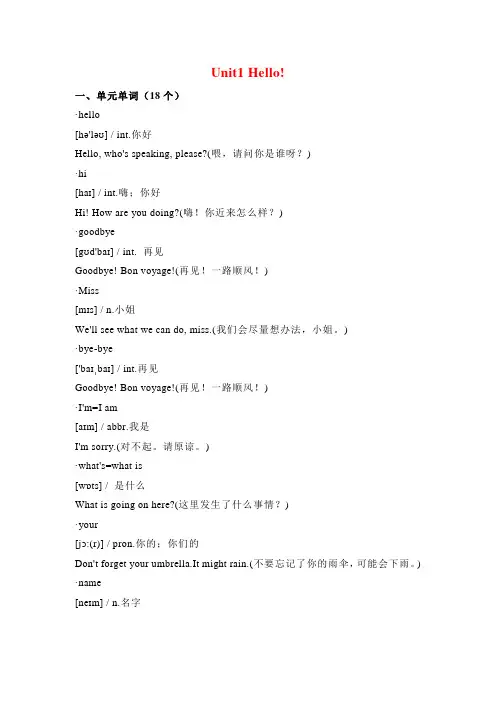
Unit1 Hello!一、单元单词(18个)·hello[hə'ləʊ] / int.你好Hello, who's speaking, please?(喂,请问你是谁呀?)·hi[haɪ] / int.嗨;你好Hi! How are you doing?(嗨!你近来怎么样?)·goodbye[gʊd'baɪ] / int. 再见Goodbye! Bon voyage!(再见!一路顺风!)·Miss[mɪs] / n.小姐We'll see what we can do, miss.(我们会尽量想办法,小姐。
)·bye-bye['baɪˌbaɪ] / int.再见Goodbye! Bon voyage!(再见!一路顺风!)·I'm=I am[aɪm] / abbr.我是I'm sorry.(对不起。
请原谅。
)·what's=what is[wɒts] / 是什么What is going on here?(这里发生了什么事情?)·your[jɔ:(r)] / pron.你的;你们的Don't forget your umbrella.It might rain.(不要忘记了你的雨伞,可能会下雨。
) ·name[neɪm] / n.名字This king even has an English name.(这位皇帝甚至有英文名。
) ·my[maɪ] / adj.我的This is my baby boy.(这是我的宝贝儿子。
)·is[ɪz] / vt.& vi.是This is a day to be remembered.(这是一个值得记住的日子。
) ·apple[ˈæpl] / n.苹果Do you like apples?(你喜欢苹果吗?)·boy[bɔɪ] / n.男孩The little boy loves to read.(这个小男孩喜欢看书。
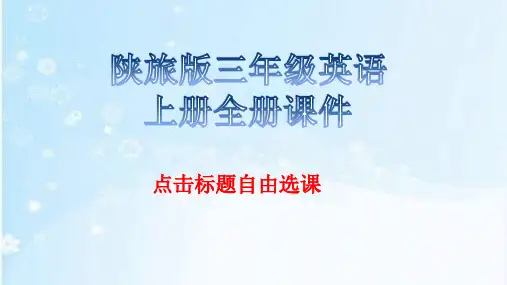
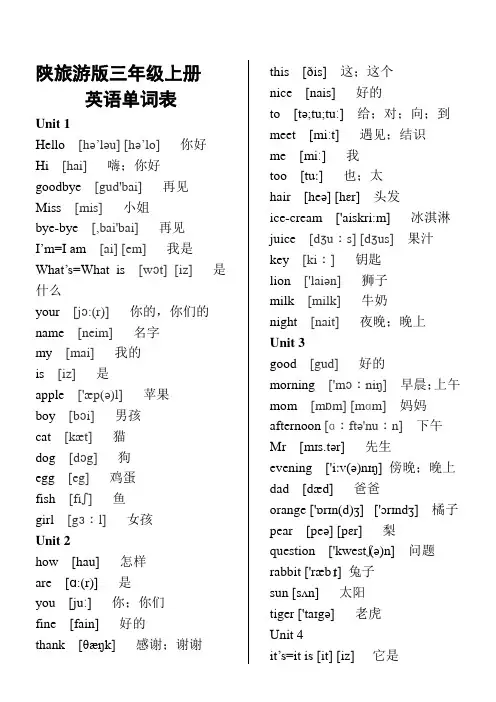
陕旅游版三年级上册英语单词表Unit 1Hello [hə’ləu] [hə’lo]你好Hi [hai]嗨;你好goodbye[gud'bai] 再见Miss [mis]小姐bye-bye [,bai'bai] 再见I’m=I am [ai][em]我是W hat’s=What is [wɔt] [iz]是什么your [jɔ:(r)]你的,你们的name [neim]名字my [mai]我的is [iz]是apple ['æp(ə)l]苹果boy [bɔi]男孩cat [kæt]猫dog [dɔg]狗egg [eg]鸡蛋fish [fiʃ]鱼girl [gɜːl]女孩Unit 2how [hau] 怎样are [ɑ:(r)] 是you [juː] 你;你们fine [fain] 好的thank [θæŋk]感谢;谢谢this [ðis] 这;这个nice [nais] 好的to [tə;tu;tuː] 给;对;向;到meet [miːt] 遇见;结识me [miː] 我too[tuː]也;太hair [heə] [hɛr] 头发ice-cream ['aiskri:m] 冰淇淋juice [dʒuːs][dʒus]果汁key [kiː]钥匙lion ['laiən]狮子milk [milk]牛奶night [nait]夜晚;晚上Unit 3good [gud]好的morning ['mɔːniŋ]早晨;上午mom [mɒm][mɑm]妈妈afternoon [ɑːftə'nuːn]下午Mr [mɪs.tər] 先生evening ['iːv(ə)nɪŋ]傍晚;晚上dad [dæd] 爸爸orange ['ɒrɪn(d)ʒ] ['ɔrɪndʒ] 橘子pear [peə] [pɛr] 梨question ['kwestʃ(ə)n] 问题rabbit ['ræbɪt] 兔子sun [sʌn] 太阳tiger ['taɪgə] 老虎Unit 4it’s=it is [it] [iz]它是a [ə; eɪ] 一;一个no [nəu] 不;不是it [it] 它isn’t=is not [iz][nɒt]不是look [luk] 看that [ðæt; ðət] 那;那个yes [jes] 是;是的an [æn; ən] 一;一个umbrella [ʌm'brelə] 雨伞vegetable [vedʒtəbl] 蔬菜water ['wɔːtə] 水box [bɒks] 盒子yellow ['jeləu] 黄色;黄色的zoo [zuː] 动物园Unit 5I 我have [hæv] 有bag [bæg] 书包in [in] 在…里面how many [hau] ['menɪ] 多少eraser [ɪ'reɪzə] 橡皮pencil ['pens(ə)l; -sɪl] 铅笔pen [pen] 钢笔crayon [kreɪən] 蜡笔ruler ['ruːlə] 尺子book [buk] 书;课本do [duː](助动词)做and [ənd; (ə)n; ænd] 和some [sʌm;səm] 一些don’t [dəunt] (助动词的否定形式)不做what [wɒt] 什么Unit 6at [æt; ət] 在;向toy [tɒɪ] 玩具plane [pleɪn] 飞机ship [ʃɪp] 船kite [kaɪt] 风筝car [kɑː]小汽车ball [bɔːl]球bike [baɪk] 自行车they [ðeɪ] 他们;她们;它们these [ðiːz]这些those [ðəʊz] 那些Unit 7bear [beə] 熊where [weə] 哪里;哪儿live [laɪv;lɪv] 居住;生活one [wʌn] 一two [tuː]二panda ['pændə] 熊猫three [θriː]三four [fɔː]四monkey ['mʌŋkɪ] 猴子five [faɪv] 五elephant ['elɪf(ə)nt] 大象ten [ten] 十animal ['ænɪm(ə)l] 动物six [sɪks] 六nine [naɪn] 九Unit 8colour ['kʌlə] 颜色blue [bluː]蓝色;蓝色的green [griːn]绿色;绿色的red [red] 红色;红色的orange ['ɒrɪn(d)ʒ] 橘色;橘色的black [blæk] 黑色;黑色的white [waɪt] 白色;白色的brown [braʊn] 棕色;棕色的eight [eɪt] 八seven ['sev(ə)n] 七陕旅游版三年级下册英语单词表Unit 1body ['bɒdɪ] n. 身体;head [hed] 头eye [ai] 眼睛nose [nəuz] 鼻子mouth [mauθ]嘴face [feis] 脸ear [ɪə] 耳朵;the [ðə;ði:] 这(那);这(那)些has [hæz] (have的单三形式)有arm [ɑːm] 胳膊;手臂hand [hænd] 手does [dʌz] (do的单三形式)做leg [leg] 腿feet [fiːt](foot的复数)脚doesn’t ['dʌznt] (do的单三否定形式)不做Unit 2family [fæməlɪ] 家庭;家;家人people ['piːp(ə)l] 人there [ðeə; ðə] 那里;(与be连用)有who [huː; h u] pron. 谁;什么人brother ['brʌðə] 哥哥;弟弟sister ['sɪstə] 姐姐;妹妹grandma ['græn(d)mɑː] n.奶奶;外婆grandpa [grænpɑ:] n. 爷爷;外公father ['fɑːðə]父亲he [hiː]他she [ʃiː]她Unit 3come [kʌm] 来school [skuːl]学校go [gəʊ] 去bus [bʌs] 公共汽车train [treɪn] 火车ship [ʃɪp] 船;舰taxi ['tæksɪ] 出租车home [həʊm] 家;在家by [baɪ] (表交通方式)乘;骑about [ə'baʊt] 关于;涉及what about [wɒt] [ə'baʊt] 怎么样on foot [ɒn] [fut] 步行Unit 4whose [huːz] 谁的coat [kəʊt] 大衣wear [weə] 穿;戴dress [dres] 连衣裙trousers ['traʊzəz] 裤子skirt [skɜːt]短裙;裙子cap [kæp] 帽子sweater ['swetə(r)] 毛衣shoes ['ʃuːz]鞋子socks [sɑks]袜子;短袜very much ['verɪ mʌtʃ] 很;非常You’re welcome ['welkəm]不客气her [hə(r)] 她的;她his [hɪz] 他的;他Unit 5like [laɪk] 喜爱;喜欢candy ['kændi] 糖果cake [keɪk] 蛋糕bread [bred] 面包cookie ['kuki] 饼干;点心tea [tiː]茶;茶叶;茶树;茶点grapes [greɪps] n. 葡萄banana [bə'nɑːnə]香蕉Unit 6can [kæn] 能;可以find [faind] 发现;找到chair [tʃeə] 椅子desk [desk] 课桌;桌子window ['wɪndəʊ] 窗户door [dɔː] 门floor [flɔː] 地板classroom ['klɑːsruːm] 教室excuse me ikskju:z mi: 扰一下thanks [θæŋks] 谢谢under ['ʌndə] 在…下面near [niə] 在…附近Unit 7TV [ti: vi:] 电视student ['stjuːd(ə)nt] 学生teacher ['tiːtʃə] 老师blackboard ['blækbɔːd] 黑板fan [fæn] 吊扇;风扇light [lait] 灯;日光灯twenty ['twentɪ] 二十eleven [ɪ'lev(ə)n] 十一twelve [twelv] 十二thirteen [θɜː'tiːn;]十三fourteen [fɔː'tiːn;] 十四fifteen [fɪf'tiːn; 'fɪftiːn] 十五sixteen [sɪks'tiːn; 'sɪkstiːn] 十六seventeen [sevntiːn] 十七eighteen [eɪ'tiːn; 'eɪtiːn] 十八nineteen [nain'tiːn] 十九Unit 8long [lɒŋ]长的see [siː] 看见big [bɪg] 大的small [smɔːl] 小的tall [tɔːl] 高的short [ʃɔːt] 短的;矮的grass [grɑːs] 草tree [triː] 树but [bʌt; bət] 但是its [ɪts] 它的陕旅游版四年级上册英语单词表Unit 1nurse [nɜːs] 护士cook [kuk] 厨师farmer ['fɑːmə] 农民doctor ['dɒktə] 医生worker ['wɜːkə] 工人driver ['draɪvə] 司机policeman [pə'liːsmən] 男警察want [wɒnt] 想;想要be [biː] 是man [mæn] 男人Unit 2farm [fɑːm] 农场pig [pɪg] 猪horse [hɔːs] 马cow [kaʊ] 奶牛sheep [ʃiːp] 绵羊duck [dʌk] 鸭子hen [hen] 母鸡really ['rɪəlɪ] 真正地many ['menɪ] 许多;多的any ['enɪ] 任何Unit 3for [fə(r); fɔ:(r)] 就…而言breakfast ['brekfəst] 早餐lunch [lʌn(t)ʃ] 午餐rice [raɪs] 米饭noodles [nu:dlz] 面条soup [suːp] 汤dumplings ['dʌmplɪŋz]饺子meat [miːt] 肉chicken ['tʃɪkɪn] 鸡肉we [wiː] 我们great [greɪt] 好的;极好的very ['verɪ] 很;非常aunt [ɑːnt] 阿姨welcome [welkəm] 欢迎dinner ['dɪnə] 晚餐ready ['redɪ] 准备好的very little ['verɪ] ['lɪt(ə)l] 很少Unit 4when [wen] 什么时候class [klɑːs] 课程;班级get up 起床have class 上课have lunch 吃午餐play [pleɪ] 玩game [geɪm] 游戏play games 玩游戏watch [wɒtʃ] 看;观看watch TV 看电视bed [bed] 床go to bed 上床睡觉at [æt; ət] 在(时间的某一点)early ['ɜːlɪ] 早的late [leɪt] 晚的;迟的Unit 5our [aʊə] 我们的library [laɪbrərɪ] 图书馆garden ['gɑːd(ə)n] 花园playground ['pleɪgraʊnd] 操场toilet [tɔɪlɪt] 洗手间computer [kəm'pjuːtə] 电脑office ['ɒfɪs] 办公室teachers’ office 教师办公室gate [geɪt] 大门;门口school gate 学校大门of course ɔv kɔː(r)s 一定;当然Unit 6subject [sʌbdʒɪkt; səbdʒekt] 科目;学科Math [mæθ]数学PE [pi’i]体育Music ['mjuːzɪk] 音乐Chinese [tʃaɪniːz] 语文Englishi 英语Science ['saɪəns] 科学Art [ɑːt] 美术be good at 擅长drawing ['drɔː(r)ɪŋ]绘画not [nɒt] 不;没有Unit 7Tuesday ['tjuːzdeɪ; -dɪ] 星期二Sunday [sʌndeɪ; sʌndi] 星期日Monday [mʌndeɪ; mʌndi] 星期一Wednesday [wenzdɪ] 星期三Thursday ['θɜːzdeɪ; -dɪ] 星期四Friday [fraɪdeɪ] 星期五Saturday [sætədɪ; -deɪ] 星期六week [wiːk]周;星期day [deɪ] 一天;白天today [tə'deɪ] 今天draw [drɔː]画;绘画picture ['pɪktʃə] 图片;图画draw picture 绘画Unit 8play ball [pleɪ] [bɔːl]玩球run [rʌn] 跑步swim [swɪm] 游泳dance [dɑːns]跳舞jump [dʒʌmp] 跳;蹦rope [rəʊp] 绳子;绳索jump rope 跳绳basketball ['bɑːskɪtbɔːl]篮球play basketball 打篮球sing [sɪŋ]唱;歌唱song [sɒŋ]歌曲sing songs 唱歌after ['ɑːftə]在…之后after class 课下;下课后together [tə'geðə] 一起;共同OK 好;可以every ['evrɪ] 每个的;每一的often ['ɒf(tə)n] 经常陕旅游版四年级下册英语单词表Unit 1new [njuː]新的house [haʊs] 房子study ['stʌdɪ] 书房bedroom ['bedruːm; -rʊm] 卧室kitchen ['kɪtʃɪn; -tʃ(ə)n] 厨房bathroom ['bɑːθruːm;]浴室;卫生间room [ruːm; rʊm] 房间living room 'lɪvɪŋ ru:m]客厅dining room [daɪnɪŋ ru:m]餐厅beautiful [bju:tɪfl]美丽的;漂亮的for [fə(r); fɔ:(r)] 为;给clean [kliːn]干净的;清洁的Unit 2cook [kʊk] 做饭read [ri:d;red]读;阅读write [raɪt] 写;写作sleep [sliːp]睡觉eat [iːt]吃listen ['lɪs(ə)n] 听stand [stænd] 站;站立sit [sɪt] 坐body ['bɒdɪ] 婴儿How about…? 怎么样?Unit 3snow [snəʊ] 雪need [niːd]需要rain [reɪn] 雨;下雨cloud [klaʊd] 云;云朵wind [wɪnd; waɪnd] 风sky [skaɪ] 天空raincoat ['reɪnkəʊt] 雨衣glasses [glɑːsiz]眼镜dear [dɪə] 亲爱的please [pliːz]请take [teɪk] 拿;取take out 拿出;取出put on 穿上;戴上them [ðem; ðəm] 它们:他们;她们(宾格形式)Unit 4weekend [wiːkɛnd] 周末fly [flaɪ] 飞;放飞fly a kite 放风筝football ['fʊtbɔːl]足球play football 踢足球exercise ['eksəsaɪz] 运动;练习do exercise 做运动film [fɪlm] 电影see a film 看电影wash [wɒʃ] 洗do some washing 洗衣服climb [klaɪm] 爬;攀登mountain [maʊntən] 山;山脉climb the mountain 爬山homework ['həʊmwɜːk]作业do one’s homework 做作业sometimes ['sʌmtaɪmz] 有时;间或with [wɪð] …同;和…一起Unit 5date [deɪt] 日期park [pɑːk]公园cinema [sɪnəmɑ:sɪnəmə] 电影院shop [ʃɒp] 商店bookstore ['bʊkstɔː]书店hospital ['hɒspɪt(ə)l] 医院bus stop 公共汽车站buy [baɪ] 买story ['stɔːrɪ] 故事buy a story book 买故事书tomorrow [tə'mɒrəʊ] 明天Children’s Day 儿童节happy ['hæpɪ] 高兴的;快乐的work [wɜːk]工作Unit 6birthday ['bɜːθdeɪ] 生日party ['pɑːtɪ]聚会;宴会gift [gɪft] 礼物;礼品flower ['flaʊə] 花card [kɑːd]卡片;贺卡balloon [bə'luːn]气球candle ['kænd(ə)l] 蜡烛idear [aɪ’dɪə] 想法;注意make [meɪk] 制作make a card 做卡片parent ['peər(ə)nt] 父亲(或母亲)thirty ['θɜːtɪ] 三十forty ['fɔːtɪ] 四十fifty ['fɪftɪ] 五十sixty ['sɪkstɪ] 六十seventy ['sev(ə)ntɪ] 七十eighty ['eɪtɪ] 八十ninety ['naɪntɪ] 九十hundred ['hʌndrəd] 百How old 多大;几岁know [nəʊ] 知道then [ðen] 那么;然后Unit 7careful [keəfl] 小心的stop [stɒp] 停止wait [weɪt] 等待right [raɪt] 右;右边turn right [tɜːn] [raɪt] 右转left [left] 左;左边turn left [tɜːn] [left]左转traffic ['træfɪk] 交通traffic lights 交通灯cross [krɒs] 横过;穿过street [striːt]街道cross the street 过马路can [kæn] 能;可以now [naʊ] 现在sorry ['sɒrɪ] 抱歉;对不起minute ['mɪnɪt] 分钟;片刻wait a minute 等一会Unit 8speak [spiːk]说话hear [hɪə] 听;听到see [siː]看;看见help [help] 帮助open ['əʊp(ə)n] 开;打开close [kləʊs] 关;关闭photo ['fəʊtəʊ] 照片take photos 拍照片play the music 播放音乐well [wel] 好地;很好try [traɪ] 尝试;努力helpful ['helpfʊl; -f(ə)l] 有帮助的us [əs; ʌs] 我们(宾格形式)陕旅游版五年级上册英语单词表Unit 1time [taɪm] 时间on time 按时clock [klɒk] 钟;时钟wall [wɔːl]墙come in 进来sit down 坐下be late 迟到play computer games 玩电脑游戏may [meɪ] 可以again [ə'gen; ə'geɪn] 又;再次too many 太多Unit 2make the bed 整理床铺sweep [swiːp]打扫;清理sweep the floor 扫地dish [dɪʃ] 盘;餐具do the dishes 洗餐具water ['wɔːtə] 给…浇水water the flowers 浇花clean [kliːn]清扫;干净clean the windows 擦窗户meal [miːl]餐;饭cook the meal 做饭clothes [kləʊ(ð)z] 衣服wash the clothes 洗衣服sure [ʃɔ:(r)] 当然Unit 3favorite ['feɪvərɪt] 最喜欢的;最喜爱的人或物food [fuːd]食物hamburger [hæmbɜ:gə] 汉堡China [tʃaɪnə] 中国the USA 美国fruit [fruːt]水果drink [drɪŋk]饮料chocolate ['tʃɒk(ə)lət] 巧克力best [best] 最delicious [dɪ'lɪʃəs]美味的;可口的Chinese [tʃaɪniːz]中国的;中国人的coffee ['kɒfɪ] 咖啡love [lʌv] 喜欢;喜爱Unit 4table ['teɪb(ə)l] 餐桌at table 吃饭spoon [spuːn]勺子cut [kʌt] 切knife [naɪf] 刀子;小刀chopsticks ['tʃɒpstɪks] 筷子use [juːz]用;使用fork [fɔːk]叉子pass [pɑːs]递;传递with [wɪð] 用;借助like [laɪk] 像;像…一样would [wʊd; wəd] 愿意beef [biːf]牛肉him [hɪm] 他(he的宾格)here [hɪə] 这;这里give [gɪv] 给Unit 5way [weɪ] 路线supermarket['suːpəmɑːk it;]超市beside [bɪ'saɪd] 在…旁边behind [bɪ'haɪnd] 在…之后between [bɪ'twiːn]在…之间Children’s Park 儿童公园take a bus 乘公共汽车get off 下(车、马等)along [ə'lɒŋ]沿着;顺着on the left 在左边get to 到达;抵达Unit 6how much 多少钱shirt [ʃɜːt]衬衣T-shirt ['ti, ʃɜ:t] T恤shorts [ʃɔːts]短裤pair [peə] 双;对a pair of 一条;一双;一副for [fə(r); fɔ:(r)] 为;给;对child [tʃaɪld] 孩子look [lʊk] 看起来take [teɪk] 买;要;拿Unit 7thin [θɪn] 瘦的aunt [ɑːnt]姨;姑;婶;伯母;舅母uncle ['ʌŋk(ə)l] 伯;叔;舅;姑父;姨父kid [kɪd] 小孩friend [frend] 朋友strong [strɒŋ]强壮的old [əʊld] 年老的young [jʌŋ]年轻的come from 来自a little 少量;少许sport [spɔːt]运动fast [fɑːst]快;迅速地woman ['wʊmən] 女人;妇女in [ɪn] 穿着;戴着their [ðeə] 他(她、它)们的right [raɪt] 正确的Unit 8visit ['vɪzɪt] 参观;游览city ['sɪtɪ] 城市hotel [həʊtel] 宾馆the UK 英国France [frɑːns]法国Australia [ɒ'streɪlɪə] 澳大利亚map [mæp] 地图far [fɑː]远的;遥远的far away 远;遥远autumn ['ɔːtəm] 秋天far from 远离。
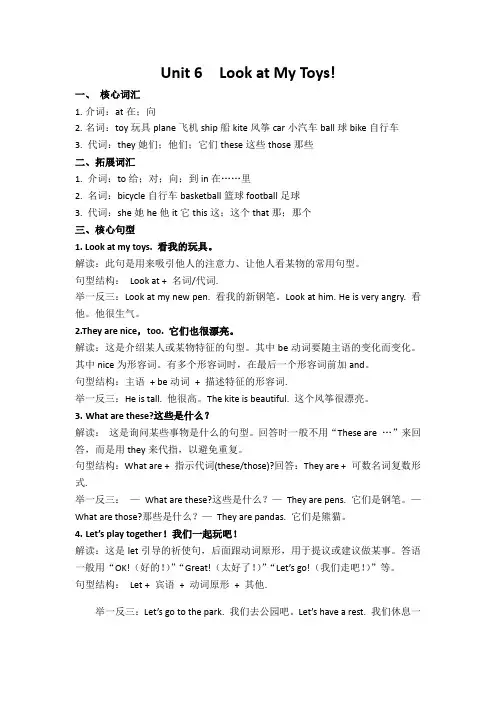
Unit 6 Look at My Toys!一、核心词汇1.介词:at在;向2.名词:toy玩具plane飞机ship船kite风筝car小汽车ball球bike自行车3. 代词:they她们;他们;它们these这些those那些二、拓展词汇1. 介词:to给;对;向;到in在……里2. 名词:bicycle自行车basketball篮球football足球3. 代词:she她he他it它this这;这个that那;那个三、核心句型1. Look at my toys. 看我的玩具。
解读:此句是用来吸引他人的注意力、让他人看某物的常用句型。
句型结构:Look at + 名词/代词.举一反三:Look at my new pen. 看我的新钢笔。
Look at him. He is very angry. 看他。
他很生气。
2.They are nice,too. 它们也很漂亮。
解读:这是介绍某人或某物特征的句型。
其中be动词要随主语的变化而变化。
其中nice为形容词。
有多个形容词时,在最后一个形容词前加and。
句型结构:主语+ be动词+ 描述特征的形容词.举一反三:He is tall. 他很高。
The kite is beautiful. 这个风筝很漂亮。
3.What are these?这些是什么?解读:这是询问某些事物是什么的句型。
回答时一般不用“These are …”来回答,而是用they来代指,以避免重复。
句型结构:What are + 指示代词(these/those)?回答:They are + 可数名词复数形式.举一反三:—What are these?这些是什么?—They are pens. 它们是钢笔。
—What are those?那些是什么?—They are pandas. 它们是熊猫。
4.Let’s play together!我们一起玩吧!解读:这是let引导的祈使句,后面跟动词原形,用于提议或建议做某事。
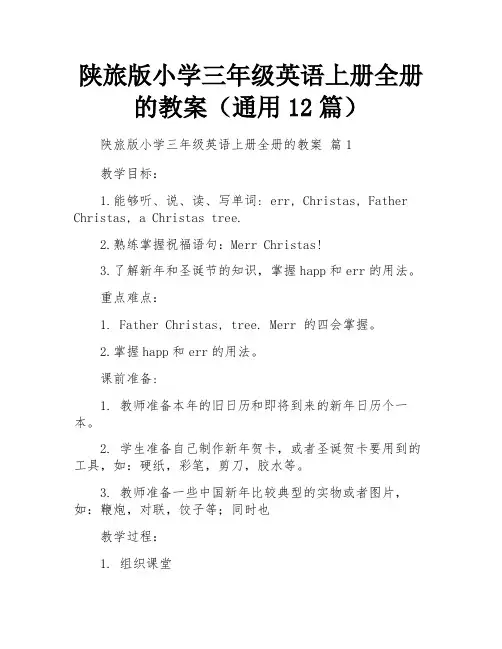
陕旅版小学三年级英语上册全册的教案(通用12篇)陕旅版小学三年级英语上册全册的教案篇1教学目标:1.能够听、说、读、写单词: err, Christas, Father Christas, a Christas tree.2.熟练掌握祝福语句:Merr Christas!3.了解新年和圣诞节的知识,掌握happ和err的用法。
重点难点:1. Father Christas, tree. Merr 的四会掌握。
2.掌握happ和err的用法。
课前准备:1. 教师准备本年的旧日历和即将到来的新年日历个一本。
2. 学生准备自己制作新年贺卡,或者圣诞贺卡要用到的工具,如:硬纸,彩笔,剪刀,胶水等。
3. 教师准备一些中国新年比较典型的实物或者图片,如:鞭炮,对联,饺子等;同时也教学过程:1. 组织课堂放录音,跟唱歌曲Happ New ear!师生互致问候,开始上课。
2. 新课展示1)教师可以通过自己的表情变化让学生理解happ一词的含义,紧接着,教师可以通过送贺年卡的形式引出Happ New ear!通过送圣诞卡引出Merr Chritas!在此教师要给学生说明:“New”是个形容词,表示新的,New ear就是新年,而Happ New ear!就可以翻译为新年快乐;同时我们可以说Happ Teachers’ Da!(教师节)Happ Children’s Da!(儿童节)Happ Mthers’ Da!(母亲节)Happ Wen’s Da!(三八妇女节)虽然happ和err都有表示“快乐的”的意思,但是我们习惯上说MerrChristas!,教师可以结合班里孩子们的程度适当为他们介绍相关圣诞节的知识,以帮助他们了解西方文化:人们在圣诞节要用彩灯(Christas lights)装扮房子,在客厅里装扮起圣诞树(Christas tree),树顶上总是放一颗星星(a star),家人都互相送礼物(Christas gifts).他们把礼物包装起来,挂在圣诞树上或凡在树下,全家人在圣诞节这天(n Christas Da)早上拆开礼物。
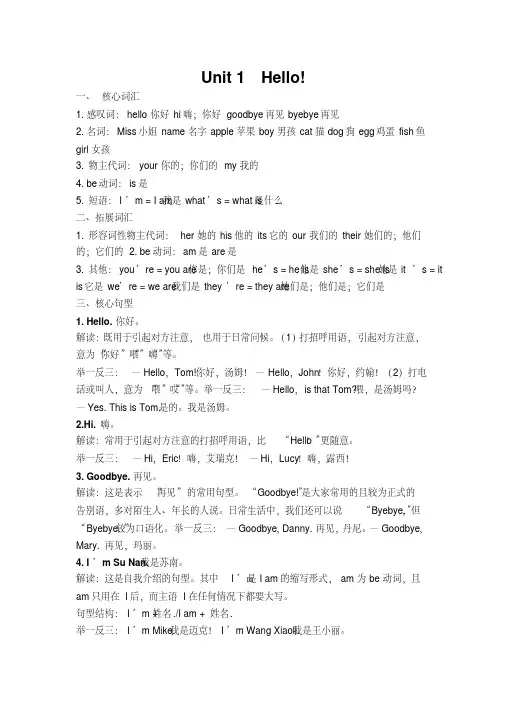
Unit 1 Hello!一、核心词汇1.感叹词:hello你好hi嗨;你好goodbye再见byebye再见2.名词:Miss小姐name名字apple苹果boy男孩cat猫dog狗egg鸡蛋fish鱼girl女孩3. 物主代词:your你的;你们的my我的4. be动词:is是5. 短语:I’m = I am我是what’s = what is是什么二、拓展词汇1. 形容词性物主代词:her她的his他的its它的our我们的their她们的;他们的;它们的 2. be动词:am是are是她是it’s = it 3. 其他:you’re = you are你是;你们是he’s = he is他是she’s = she isis它是we’re = we are我们是they’re = they are她们是;他们是;它们是三、核心句型1. Hello. 你好。
解读:既用于引起对方注意,也用于日常问候。
(1)打招呼用语,引起对方注意,意为“你好”“喂”“嗨”等。
举一反三:— Hello,Tom!你好,汤姆!— Hello,John!你好,约翰!(2)打电话或叫人,意为“喂”“哎”等。
举一反三:— Hello,is that Tom?喂,是汤姆吗?— Yes. This is Tom. 是的。
我是汤姆。
2.Hi. 嗨。
解读:常用于引起对方注意的打招呼用语,比“Hello!”更随意。
举一反三:— Hi,Eric!嗨,艾瑞克!— Hi,Lucy!嗨,露西!3.Goodbye. 再见。
是大家常用的且较为正式的解读:这是表示“再见” 的常用句型。
“Goodbye!” ,但告别语,多对陌生人、年长的人说。
日常生活中,我们还可以说“Byebye.”较为口语化。
举一反三:— Goodbye,Danny. 再见,丹尼。
— Goodbye,“Byebye.”Mary. 再见,玛丽。
我是苏南。
4.I’m Su Nan.解读:这是自我介绍的句型。
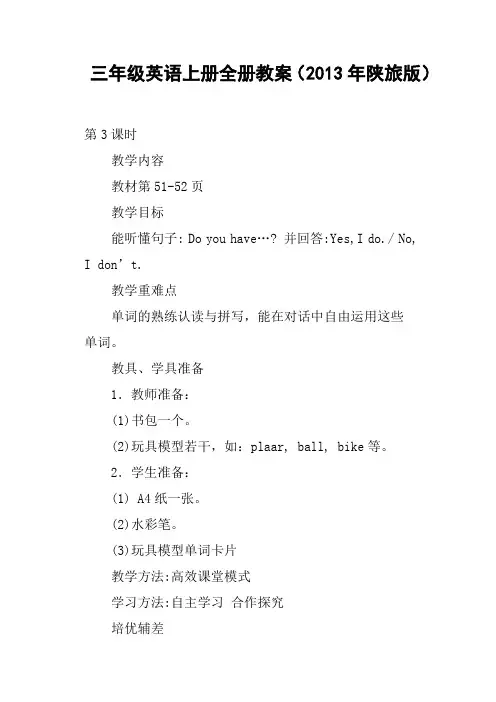
三年级英语上册全册教案(2013年陕旅版)第3课时教学内容教材第51-52页教学目标能听懂句子: Do you have…? 并回答:Yes,I do./ No,I don’t.教学重难点单词的熟练认读与拼写,能在对话中自由运用这些单词。
教具、学具准备1.教师准备:(1)书包一个。
(2)玩具模型若干,如:plaar, ball, bike等。
2.学生准备:(1) A4纸一张。
(2)水彩笔。
(3)玩具模型单词卡片教学方法:高效课堂模式学习方法:自主学习合作探究培优辅差教学过程学案导学,自主探究1.复习句型- Do you have a toys?- Yes, I do.- What a?- They a- What a?- They a2. 组织学生听并理解内容,然后相互交流。
- Do you have apple?- Yes,I do.- Do you have oranges?- No, I don’t.教师点拨,释疑解难组织学生听并理解内容,然后相互交流。
A: What’s this?B: It’s a bA: What a?B: They are rulA: W hat’s that?B: It’s an eraA: What a?B: They are cra归纳总结,反馈练习A: What’s this/ that?B: It’s a/ an …A: What a/those?B: They are …检测达标What’g? 游戏。
课后作业1.把今天所学的句型正确规范的各写一遍。
2. 记会本课所学的七个单词。
第4课时教学内容Part C:Read and color; Listen and circle ;Look and talk教学目标1.能熟练的运用所学句型 What a/ those?- They are…;Do you have…? - Yes, I do./ No, I don’t 进行对话。
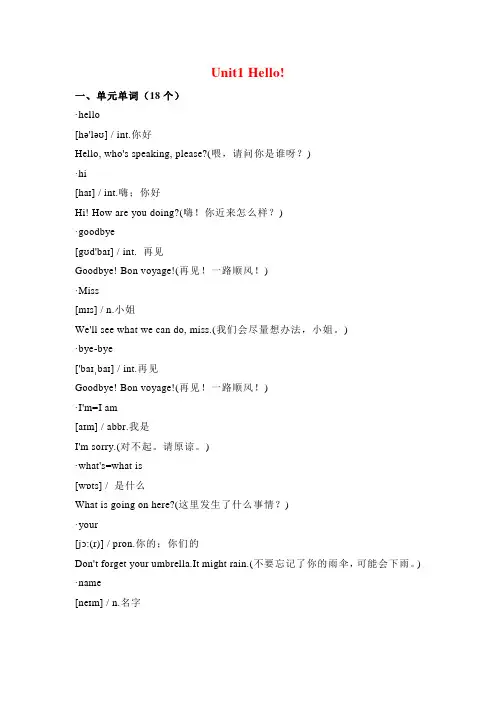
Unit1 Hello!一、单元单词(18个)·hello[hə'ləʊ] / int.你好Hello, who's speaking, please?(喂,请问你是谁呀?)·hi[haɪ] / int.嗨;你好Hi! How are you doing?(嗨!你近来怎么样?)·goodbye[gʊd'baɪ] / int. 再见Goodbye! Bon voyage!(再见!一路顺风!)·Miss[mɪs] / n.小姐We'll see what we can do, miss.(我们会尽量想办法,小姐。
)·bye-bye['baɪˌbaɪ] / int.再见Goodbye! Bon voyage!(再见!一路顺风!)·I'm=I am[aɪm] / abbr.我是I'm sorry.(对不起。
请原谅。
)·what's=what is[wɒts] / 是什么What is going on here?(这里发生了什么事情?)·your[jɔ:(r)] / pron.你的;你们的Don't forget your umbrella.It might rain.(不要忘记了你的雨伞,可能会下雨。
) ·name[neɪm] / n.名字This king even has an English name.(这位皇帝甚至有英文名。
) ·my[maɪ] / adj.我的This is my baby boy.(这是我的宝贝儿子。
)·is[ɪz] / vt.& vi.是This is a day to be remembered.(这是一个值得记住的日子。
) ·apple[ˈæpl] / n.苹果Do you like apples?(你喜欢苹果吗?)·boy[bɔɪ] / n.男孩The little boy loves to read.(这个小男孩喜欢看书。
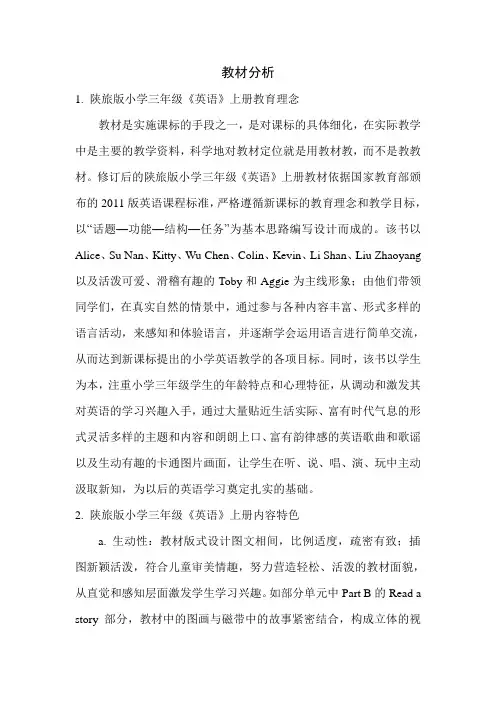
教材分析1. 陕旅版小学三年级《英语》上册教育理念教材是实施课标的手段之一,是对课标的具体细化,在实际教学中是主要的教学资料,科学地对教材定位就是用教材教,而不是教教材。
修订后的陕旅版小学三年级《英语》上册教材依据国家教育部颁布的2011版英语课程标准,严格遵循新课标的教育理念和教学目标,以“话题—功能—结构—任务”为基本思路编写设计而成的。
该书以Alice、Su Nan、Kitty、Wu Chen、Colin、Kevin、Li Shan、Liu Zhaoyang 以及活泼可爱、滑稽有趣的Toby和Aggie为主线形象;由他们带领同学们,在真实自然的情景中,通过参与各种内容丰富、形式多样的语言活动,来感知和体验语言,并逐渐学会运用语言进行简单交流,从而达到新课标提出的小学英语教学的各项目标。
同时,该书以学生为本,注重小学三年级学生的年龄特点和心理特征,从调动和激发其对英语的学习兴趣入手,通过大量贴近生活实际、富有时代气息的形式灵活多样的主题和内容和朗朗上口、富有韵律感的英语歌曲和歌谣以及生动有趣的卡通图片画面,让学生在听、说、唱、演、玩中主动汲取新知,为以后的英语学习奠定扎实的基础。
2. 陕旅版小学三年级《英语》上册内容特色a. 生动性:教材版式设计图文相间,比例适度,疏密有致;插图新颖活泼,符合儿童审美情趣,努力营造轻松、活泼的教材面貌,从直觉和感知层面激发学生学习兴趣。
如部分单元中Part B的Read a story部分,教材中的图画与磁带中的故事紧密结合,构成立体的视听结构,以更形象化的语言和场景相结合让学生巩固所学知识内容,以培养学生学英语的兴趣、信心、策略和习惯为根本出发点,为学生英语能力的持续发展打下坚实的基础。
b. 趣味性:教材中安排了节奏明快的chant、具有较强感染力的英文歌曲、走迷宫、涂颜色等教学内容,听、说、做、玩、唱、演的内容安排,使表现形式丰富多样,既富于情趣,又能开发学生智力。
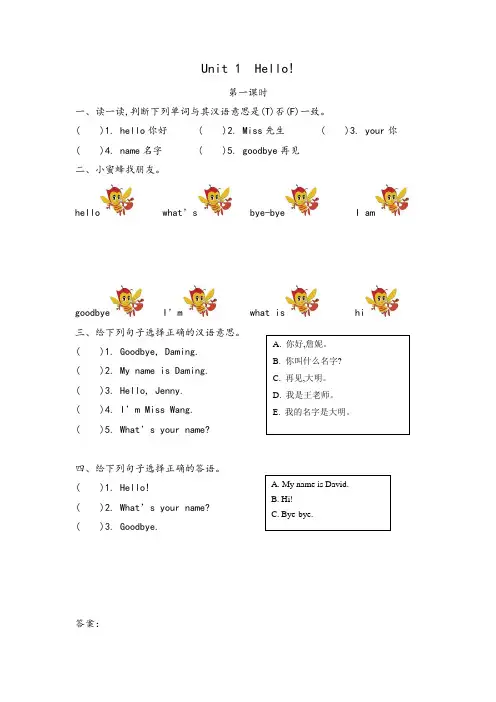
Unit 1 Hello!第一课时一、读一读,判断下列单词与其汉语意思是(T)否(F)一致。
( )1. hello你好( )2. Miss先生( )3. your你( )4. name名字( )5. goodbye再见二、小蜜蜂找朋友。
hello what’s bye-bye I amgoodbye I’m what is hi三、给下列句子选择正确的汉语意思。
( )1. Goodbye, Daming. ( )2. My name is Daming. ( )3. Hello, Jenny. ( )4. I’m Miss Wang. ( )5. What’s your name?四、给下列句子选择正确的答语。
( )1. Hello!( )2. What’s your name? ( )3. Goodbye.答案:A. 你好,詹妮。
B. 你叫什么名字?C. 再见,大明。
D. 我是王老师。
E. 我的名字是大明。
A. My name is David.B. Hi!C. Bye-bye.一、1. T 2. F 3. F 4. T 5. T二、hello — hi what’s — what is bye-bye — goodbye I am — I’m三、1. C 2. E 3. A 4. D 5. B四、1. B 2. A 3. C第二课时一、按字母表顺序,写出所缺的字母,大小写保持一致。
1. B2. c3. A D二、补全单词。
1. pple2. oy3. at4. og三、给下列图片选择正确的单词。
A. dogB.appleC.boyD.cat( )( )( )( )四、根据句意和图片提示,补全句子。
1. Hello! I am A. A is in “_________”.2. Hello! I am B. B is in “_________”.3. Hello! I am C. C is in “_________”.答案:一、1. C D 2. a b 3. B C二、1. a 2. b 3. c 4. d三、B C D A四、1. apple 2. boy 3. cat第三课时一、根据所给字母,写出相应的大写或小写字母。
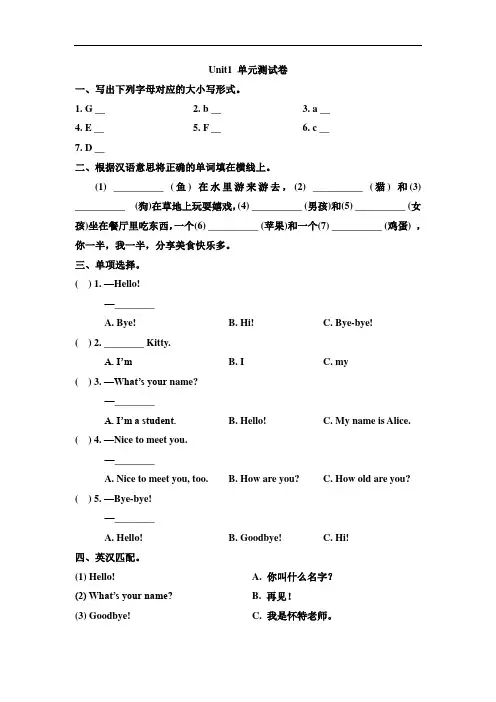
Unit1 单元测试卷一、写出下列字母对应的大小写形式。
1. G __2. b __3. a __4. E __5. F __6. c __7. D __二、根据汉语意思将正确的单词填在横线上。
(1) __________ (鱼) 在水里游来游去,(2) __________ (猫) 和(3) __________ (狗)在草地上玩耍嬉戏,(4) __________ (男孩)和(5) __________ (女孩)坐在餐厅里吃东西,一个(6) __________ (苹果)和一个(7) __________ (鸡蛋) ,你一半,我一半,分享美食快乐多。
三、单项选择。
( ) 1. —Hello!—________A. Bye!B. Hi!C. Bye-bye!( ) 2. ________ Kitty.A. I’mB. IC. my( ) 3. —What’s your name?—________A. I’m a student.B. Hello!C. My name is Alice. ( ) 4. —Nice to meet you.—________A. Nice to meet you, too.B. How are you?C. How old are you? ( ) 5. —Bye-bye!—________A. Hello!B. Goodbye!C. Hi!四、英汉匹配。
(1) Hello! A. 你叫什么名字?(2) What’s your name? B. 再见!(3) Goodbye! C. 我是怀特老师。
(4) My name is Li Lei. D. 我的名字是李磊。
(5) I’m Miss White. E. 你好!五、情景交际。
( ) 1. 当你想与朋友道别时,你可以说:A. Bye-bye.B. Hello!( ) 2. 当你想知道对方叫什么名字时,你可以问:A. What’s your name?B. How are you?( ) 3. 当你与熟人打招呼时,你可以说:A. Bye!B. Hi!( ) 4. 当怀特老师进行自我介绍时,她可以说:A. I’m Miss White. B She’s Miss White.( ) 5. 当你想告诉大家你的名字是苏南时,你可以说:A. My name is Su Nan.B. He is Su Nan.六、为下列句子选择恰当的答语。
Period 1Teaching Aims:1.以学习let's learn部分所列举的玩且类词汇为主。
要求学生能听懂,会读,会写词汇:toy,plane, ship, kite, car, ball, bike.并熟练运用。
2.引导学生完成point and say部分和listen and match部分。
Teaching Aids:Let's learn部分的玩具各一个,装玩具的大口袋。
Leading-in:1. Free talk:教师用上单元所学词汇、句型和学生轻松地进行以下问答:T: Good morning, boys and girls. I am a ruler. Show me your ruler, please.Ss: Here is my ruler!T: How are you today?(教师可以用自己的尺子和任意学生的尺子轻轻一碰,就像两个好朋友握手一样,增加问答的趣味性)Ss: I'm fine. Thank you!T: Do you have a book?Ss: Yes, I do.T: Hi, Book! Glad to meet you!(两本书相互碰碰)Ss: Glad to meet you, too.Presentation(配教材Let's learn部分的图片,展示本节课要学习的词汇)Look, listen and say教师非常兴奋地拿出课前准备好的装有玩具的大口袋,让学生猜猜里面都有什么,然后逐一拿出来边教学边展示给学生,让学生通过看、听、说初步认读该部分的词汇。
当然,教师在教授词汇的同时,可以将本单元的重点句型融人其中,但是只要求学生能听懂并配合教师完成本部分的教学内容即可,不要求学生有语言上的输出。
以下教学过程设计可供教师参考: 教师随意从大口袋中拿出一个玩具,非常神秘地展示给学生并做以下介绍:T: Hello, boys and girls! I have many toys! Look! This is a car.Ss: Wow! T: Hello, boys and girls! I have many toys! Look! This is a car.Ss: Wow! T: Wow! How nice! Look at my car! C-A-R, car!Ss: C-A-R, car!T: Car, car, I have a car!/k/,/a:/,/ka:/.Ss: Car, car, I have a car!/k/,/a:/,/ka:/.Practice ActivitiesLet's learn1. 教师播放此部分的录音,要求学生边听边按录音的先后顺序给该部分单词标上序号.2. 教师出示教学卡片并组织学生分男女生拼读词汇:如男生按升降调读两遍某个词汇,则女生拼读一遍该词汇并再读一遍,反之亦然。
三上Unit 1 HelloHello. Goodbye. / Bye-bye.What’s your name?My name is Li Shan. I’m Miss White.Nice to meet you. Nice to meet you, too.Unit 2 How are you?How are you? I’m fine. Thank you.This is Lin Lin. Nice to meet you. Me, too!Unit 3 Good morning.Good morning! Good afternoon! Good evening! Good night! Nice to see you. Me, too.Unit 4 What’s this?What’s this?It’s a cat.It’s an egg.This is a pear. That’s an apple.Is this a cat?No, it isn’t.What’s that?Is that a lion? Yes, it is.Unit 5 I have a bag.Do you have a book? Yes, I do. Do you have a pen?No, I don’t.I have a pencil, an eraser and some crayons, too.What do you have? I have some rulers. What’s in your bag? Ihave a book.Glad to meet you. How nice!Unit 6 Look at my toys!I have a toy. I have planes. How nice! They are nice.Do you have toys? Yes, I do. / No, I don’t.What are these? They are kites. What are those? They are ships.Unit 7 Are these bears?Are these bears? No, they aren’t. They are pandas.Are those monkeys? Yes, they are. How many cats do you have? I have six cats.Unit 8 What color is it?What color is it? It’s green.What colors are they? They are blue, green…三下Unit 1 My bodyThis is the head. It has a nose. These are the eyes.Those are the ears. Does it have legs? Yes, it does. / No, it doesn’t. Touch your face. Draw the hairUnit 2 My familyWho is he? This is my father. Is this your grandma? Yes, she is. / No, she isn’t.Unit 3 How do you come to school?How do you come to school? I come to school by bus.What about you? I come to school on foot.Do you go home on foot? No. I go home by bike.How do they go to the zoo? They go to the zoo by car.How does Mr. Zhao go to Xi’an? He goes to Xi’an by train.Unit 4 Whose coat is this?Whose coat is this? Is this your coat? No, it isn’t. Whose trousers are these? They are Dad’s trousers.Unit 5 Do you like Candies?Do you like candies? Yes, I do. / No, I don’t.Does the monkey like bananas? Yes, it does. / No, it doesn’t.What do you like? I like cakes very much. What does your cat like? It likes fish.Unit 6 Where is my eraser?Where is my eraser? It’s on the floor. Where are my shoes? They are under the chair. Unit 7 There is a TV in the classroom.What’s in the classroom? There is a TV in the classroom.There are two blackboards in the classroom, too.How many students are there in the classroom? There are twenty.How many fans? There are four.Unit 8 The ruler is long.The ruler is long. The pencil is short.The tree is tall. The grass is short.The cars are big. The bikes are small.四上Unit 1 What is your father?What is your father? He is a cook.What about your mother? She is a doctor.Is your mother a worker, too? No, she isn’t. She is a nurse.Is she your sister? What is she? Yes. She is a bus-driver.Who is that man? What is he? He is my brother. He is a policeman.I want to be a policeman. What about you? I want to be a doctor.Unit 2 What do they have on the farm?What are your grandpa and grandma? They are farmers.What do they have on the farm? They have pigs, ducks, … many animals. What does Colin have in his box? He has cars, planes and ships.What do they have in the box? They have bears, ducks rabbits and sheep. There’s a horse in my room.No. It’s a dog.Unit 3 What’s for breakfast?What’s for breakfast?We have eggs, bread and milk.What’s for lunch?We have rice, chicken, vegetables and soup. What’s for dinner?We have dumplings.Unit 4 When do you have classes?When do you have classes? I have classes at eight in the morning.Do you play games at school? Yes, we do.When do you play games? At four in the afternoon.Do you get up early in the morning? No. But my mother gets up very early. When does she get up? She gets up at six.When does she go to bed? She goes to bed at twelve.When do you go to bed? I go to bed late at nine.Unit 5 Our schoolThose are our classrooms.Is there a teachers’ office?Yes, there is.Are there any computers in the library? No, there aren’t.What’s in your school?There is a big playground in our school. What’s in the library?There are some desks and chairs.Are there many books in it? Book? Of course!Unit 6 What subjects do they have this morning?How many subjects do you have this morning? We have four.What are they? Let me see. Chinese, Math, English and Music. What subjects do they have this morning? They have …What’s in your hand?It’s a n English book.Do you like Music? No, I don’t. I like Art.What subject do you like? I like Chinese.Are you good at it? Yes. I’m good at it.Unit 7 It’s Tuesday.What day is it today? It’s Tuesday.What do you have on Tuesday? We have Chinese and English on Tuesday.We don’t have classes on Saturday.Is it Wednesday today? Yes, it is.What do you do on Wednesday afternoon? I draw some pictures. What does Liu Zhaoyang do on Sunday morning? She likes to play games. Unit 8 Boys like to play ball.What do they like to do after class? Boys like to play ball.Do you like to play basketball? Yes, I do.What do you like to do? I like to play basketball, too. Let’s play together.Does your father like to play basketball? No, he doesn’t.What does he like to do? He likes to swim on Sunday.四下Unit 1 Our new house (Description)This is our new house. There are two bedrooms. The big one is for my mom and dad. My bedroom is small. They are nice. Our living room is not big, but it’s beautiful. We often watch TV there. There is a kitchen and a bathroom, too.Unit 2 I’m cooking in the kitchenWhere are you? I’m in the kitchen. What are you doing? I’m cooking. Where’s Wu Chen? She is in the study. What is she doing? She is reading a book. What are the girls doing? They are listening to music. How about the boys? They are drawing pictures.Unit 3 Is it snowing?Is it snowing / raining? Yes, it is. Is there a wind? No, there isn’t. Unit 4 What do you do on Saturday?What do you do on Saturday? I often play football. What about your mother? She often does some washing.What does your father do on the weekend? He often climbs the mountains.Do you often do exercise? Yes, I do. Does your father play football, too? No, he doesn’t.Unit 5 Where are you going?Where are you going? We are going home. Is she going home, too? No, she isn’t.Where is she going? She is going to the shop. Are they going to the shop? No, they aren’t.Where are they going? They are going to the cinema.Unit 6 Today is her birthday.What are you going to do for her birthday? I’m going to make a card for her.Are you going to have a birthday party? Yes, I am.How about your parents? They’re going to buy a birthday cake. How old are you? I’m ten years old.How old is your grandma? She is sixty. And your mother? My mother is thirty-seven.Unit 7 Be careful!Be careful! Look at the traffic lights. Please stop! Don’t cross the street.Stop and wait. Let’s go. Sorry, wait a minute. Don’t turn left.Unit 8 What can you do?What can you do? I can swim. What can the monkeys do? They can climb the tree.What can the dog do? It can help the man. Can you sing a Chinese song? No, I can’t.Kitty can sing an English song. But she can’t sing a Chinese song.五上Unit 1 Get up on time!What time is it? It’s seven.What time do you get up?I get up at 8:05. What time does your grandma do go to bed? She goes to bed at nine. Unit 2 Be helpful at home!Can I help you? Sure. Can you sweep the floor? Yes, of course.What can I do for you? You are helpful. What can you do at home? I can make the bed.I often help my mother do the dishes. Can you help me cook the meal? Let me try. What can he do? He can sweep the floor. He is very helpful.Unit 3 My favorite food is hamburgersWhat’s your favorite food?My favorite food is hamburgers. What about you?I like eating dumplings best. I like rice very much.What’s your mother’s favorite food?Her favorite food is noodles.What color does your father like best? He likes black best.Does your brother love Math? Yes, he does.Unit 4 At tableUse the fork with your left hand and use the knife with your right hand. I see.Not like that. I can’t use t he chopsticks well. Would you please pass me the spoon? Here you are. Where is the knife? I want to cut the beef.Would you give me some? Here are the chopsticks.Unit 5 Can you tell me the way to the supermarket?Is there a supermarket near here? I want to buy some fruits.Can you tell me the way to the supermarket?Go along the street and you can see a hospital on the left. The supermarket is behind it.How can we get to the Children’s Park?Where is the bookstore?You can take a bus at the bus stop and get off at Park Road.There is a shop between the school and the park.Unit 6 How much is it?What can I do for you? We want to buy a T-shirt for our child.How about this green one? It’s OK.I looks good. How much is it? It’s 50 yuan.I would like a pair of shoes for my child. How about these blue ones?They look too big for her. Would you like the green ones? How much are they?They’re 100 yuan.We’ll take them.Unit 7 She looks tall and thin.Do you know the girl? She comes from the USA.She speaks English and she can speak a little Chinese. She looks tall and thin.We often play together after class. The man beside her is my uncle.She looks very beautiful in the red dress. He looks nice in orange.Unit 8 Where are you from?Where are you from? I am form the UK. Is it far from here? Not very far. Where do you come from? I come from Australia. Australia is far away.Welcome to our hotel. Welcome to visit our city. Have a good time.五下Unit 1 How are you feeling now?How are you feeling? I’m very happy.You look sad. I can’t go out to play. Are you tired? Yes, a little. Is Su Nan sad? No, he isn’t.How is he feeling? He’s feeling very tired.Unit 2 Spring is coming!What do you do in spring? I often fly kites with my friends. How about you?How interesting! There are four seasons in a year. What are the four seasons? Why do people like to go out in spring? What can we do in summer?When can we make snowmen?Unit 3 Spring begins from March.How many months are there in a year? How many months are there in a season? Which months are in spring? Which is your favorite season?The trees become red and yellow. I like winter better.Because we have Christmas on December 25th and New Year on January 1st.We can have much good time together with our family and friends.What’s the month?It’s January.When is Women’s Day?It is on March 8th. Unit 4 He lives in a village.Where do you live? I live in the village.Where does he live? He lives in the city.How can I get to the Bell Tower? You can go with me.Do you live in the city? I live in a village far from the city.Is your village big? No, it is small, but very beautiful.It sounds very nice. Where does he live? What do they grow on the farm? Unit 5 What’s the weather like today?What’s the weather like today?It’s fine.How is the weather tomorrow? It’s sunny. The weather report says it will be windy and cool tomorrow. You’d better wear your coat. You’d better take your umbrella.Unit 6 My holidayWhat are you going to do this evening? What is your father going to do tomorrow morning? What is your grandma going to do next Sunday? What is your friend going to do next week? Where will you go on the holiday? I will go to Beijing with my parents.What is the Palace Museum like? It’s large.I will enjoy my visit there.How will you go? I will go by train. W hy not go by plane? It is fast.The train is slow, but I can enjoy the beautiful places along the way.Will your parents go with you? No, they won’t.Have a good time!Unit 7 I have a headache.I feel very bad today. W hat’s wrong with you?I have a headache.You look ill. Just stay in bed. I will call the doctor.What about my lessons? Don’t worry about them. I will call y our teacher and tell her about it. He doesn’t feel well this morning.He has a fever and a bad headache. I’m sorry to hear that. You’d better take him to see a doctor.Please tell him not to worry about his lessons.Have a good rest. Does he have a headache?Unit 8 Have a good habit!Don’t litter on the floor.It’s a bad habit.You shouldn’t tell lies.We shouldn’t make a noise in the library.The boy shouldn’t write on the tree. We’d better keep quiet and we should have a good habit.I see.What are you doing?I’m reading.Don’t read in bed. It’s bad for your eyes. You shouldn’t have the book so close to your eyes.六上Unit 1 It’s time to play the violin.What are you doing? I’m having a rest.It’s time to learn English.It’s time to play the violin. It’s time to get up.You’ll have no time to have breakfast. It doesn’t matter.I’m afraid you can’t.I’ll play the violin right now.What do you do at that time? What’s the time?It’s half past seven.Unit 2 I’m healthy.You look healthy. I always eat healthy food and I like sports.How often do you drink milk? I drink milk every day. My mom says it’s good for me. How often do you play sports? I run in the morning and play tennis in the afternoon.How often does she play tennis? Twice a week. I have English classes three times a week.Unit 3 Care for the Earth.What’s the matter?What should I do? I have no time.I have to clean my bike. Why not? I think I should go to work on foot today. There are many trees in the park. There is much grass under the tree. It’s World Car Free Day. We shouldn’t cut down trees.We should plant more trees. We have only one earthUnit 4 Let’s go on a picnic.What do you often do on weekends? I usually go to the park and fly a kite. How about you? Are you free next Saturday? What’s up?H ave a good time. What shall we take? Why not have the picnic in the park? When shall we meet? How about 8:00?See you tomorrow. I wouldn’t like to do that.What would you like to do? It’s too far.Unit 5 It was just here just now.What a heavy rain. It’s behind the door.There were under your bed. That’s too bad. It was in front of the house yesterday, but now it isn’t there.I’m afraid it was lost.Were you at this school thirty years ago? Yes, I was. Was there a library? Yes, there was.Were there any trees?Yes, there were. How many students were there at that time?Was there a computer room? N o, there wasn’t.Where were you yesterday? I was in my house. What do you wear on a rainy day? I wear a raincoat on a rainy day. I was in the cinema with Tom.Unit 6 What did you do last weekend?Are you helpful at home? What do you often do? I often do the dishes.What did you do last weekend? I did some housework. They were busy. Sounds great.I’m sorry to hear that. She is better now. We had a football match.What show did you watch? What happened to her? What a good girl!What did you do last night? I didn’t make the bed, but I cooked breakfast this morning. Unit 7 I had a good time.I stayed at home. What did you do at home? I learned to cook and made a big cake by myself.I swam in the sea. Sounds interesting. Did you eat some sea food? I went with my friends. Where did you go on your holiday? Who did you go with? What did you do there?Unit 8 New Year’s PartyWhat do you think of our party? It was great. What do you think of his joke? It was funny.I think everyone had a good time. When did the party start? Who made all the students laugh?What do you think of the music? It is beautiful. It makes me happy. We had a party yesterday.六下Unit 1 May I speak to Kitty?Can I take a message? Could you please ask Kitty to call me? I’ll tell her when she comes back.Who is that? This is Kitty. Where did you go this morning? I won’t play games.I will use it to make phone calls and send messages. Sounds good. I’m afraid you can’t.I hope to have a mobile phone. My friends use them to learn English and send e-mails.It takes too much time and it’s bad for their eyes.Let me think abou it. What about you? Unit 2 What would you like?What would you like to eat? We’d like two bowls of noodles.Anything else?Would you like somethink to drink? Would you like something to eat? Yes, please. / No, thanks. What kind of noodles would you like? Please wait a minute. How much are they?Unit 3 Who’s that man?What is this man? He is a driver. What about the woman? She is a nurse.Who’s the young woman?What did she do? Which one? What does he do?What do you think of Edison? Did she have long hair then? What did he do thirty years ago? Unit 4 At the sports meeting.What are you good at? What’s your favorite sport?How often do you play it?You look tired. We had a school sports meeting yesterday. Did you win?I took part in the boys’ 100-meter race and the long jump. I was the first. I lost it. Anyway, you did well. What did he take part in at the school sports meeting?We will have a sports meeting next week. What sports will you take part in?Unit 5 What is he like?What is she like? S he is tall with glasses. She is short with short hair.What is your favorite subject? My favorite subject is Math. Why do you like it?What do you think of her? She is a little serious, but she teaches very well.What do you think of her? She is shy / outgoing / clever?What’s it like?It’s big and strong. What do you think of it? It’s hard-working. Unit 6 A school saleThere will be a sale at our school. On Children’s Day.Where shall we have it?What will you sell? What about you? Let me see. Will there be many pupils?What shall we do with the monry? We’ll give it to the poor pupils in the mountains.Next year, there will be more cars in our city. I will read more books next year.Would you like to go to see the film with me? Great. Let’s go toge ther.Unit 7 Shanghai is in the southeast of China.Come on. We’re having a meeting.What are we going to talk about?Where would you like to go? I hope to go somewhere by the sea.Hainan is in the south of China. It’s too hot in summer.I think so.There are many places of interest. Shall we fly to Shanghai? Let’s go by train.I’d like to take a train.We can enjoy the beautiful places along the way. Shanghai is in the southeast. Where did you go last summer?What do you think of the people there? They are very friendly.Is it in the north of China? Where would you like to go?Unit 8 What’s your dream?What did you talk about at your class meeting today? We talked about our dreams. What is your dream? I want to be a scientist and study the stars.Sounds great, but it’s difficult to come true.I will study hard from now on.Did you have a dream when you were young? I wanted to become a teacher.I wanted to be a tour guide and travel around the world. Whose dream is it?I want to be a driver. He wants to be a player. She wanted to be a singer.。
(完整版)陕旅版三至六年级上册重点句型汇总陕旅版三至六年级上册重点句型汇总任何考试都是万变不离其宗,对于小学英语来说,考试的内容都在教材中,考查的知识点不外乎单词、短语、句型、语法、阅读和写作,而句型则是其中的重点。
今天,为大家整理了三至六年级上册的所有重点句型,快拿去复习吧~~~~三年级上册Unit1(打招呼用语)1. Hello / Hi!2。
- I’m … What's your name? - My name is …3。
— Goodbye!— Bye—bye!Unit2(介绍、问候)1。
— Hel lo, …! How are you?- I’m fine。
Thank you. 2。
—This is …— Hello,… Nice to meet you.— Me, too!Unit3(打招呼用语)1. Good morning!2。
Good afternoon!3. Good evening!4。
Good night!Unit4(辨认物品)1. —What’s this / that?—It’s a / an …2。
- Is this / that a / an …?— Yes, it is。
/ No, it isn't.Unit5(学具)1。
I have a / an …2。
—Do you have a / an …?— Yes, I do. / No,I don’t.3。
— What do you have?—I have …Unit6(玩具)1. — I have a toy. Look!It’s a car.— How nice!2。
— What are these / those?(完整版)陕旅版三至六年级上册重点句型汇总— They are …Unit7(确认物品,数量)1. —Are these / those …?- Yes, they are. / No, they aren't。
陕旅版小学三年级英语上册全册的教案课程介绍本教案是针对陕西省旅游版小学三年级英语上册全册的教学设计。
该教材以培养学生英语口语交际能力为主要目标,通过生动有趣的课文和活动,引导学生在轻松愉快的学习氛围中掌握基本的英语词汇和语法。
本教案中包含了全册的教学内容的详细教学步骤和教学重点。
教学目标•能够正确发音并理解本册教材的词汇和句子;•能够用简单的句子进行简单的交流;•能够理解简单的对话并回答问题;•能够唱一首简单的英语歌曲;•能够通过游戏和活动培养对英语学习的兴趣。
教学内容与教学步骤Unit 1 Hello!教学内容•课文:Hello! Hello! (听说)•词汇:Hello, Hi, Goodbye, bye (听说读写)•句型:Hello, Hi, Bye-bye. (听说读写)教学步骤1.导入新课,利用图片和谈话展示“Hello”一词,并让学生体验打招呼的方式。
2.带领学生听课文Hello! Hello!,培养学生对课文的感性认知。
3.听录音,让学生跟读课文,注意发音和语调。
4.教师板书“Hello, Hi, Goodbye, bye”,并教授发音。
5.在学生练习的过程中,老师巡回指导,纠正学生的发音和语调。
6.引导学生进行角色扮演练习,模拟真实的问候与离别情境。
7.教师以问题的形式引导学生回答,巩固句型“Hello, Hi, Bye-bye”。
Unit 2 My Name’s Tony.教学内容•课文:My Name’s Tony. (听说)•词汇:name, my, your (听说读写)•句型:My name’s Tony. (听说读写)教学步骤1.导入新课,利用图片和谈话引出词汇“name”,让学生了解并重复模仿。
2.听录音,感受课文My Name’s Tony.的语音节奏和语调。
3.学生跟读课文,注意模仿录音中的语音语调。
4.教师给出“name, my, your”的发音讲解和示范。